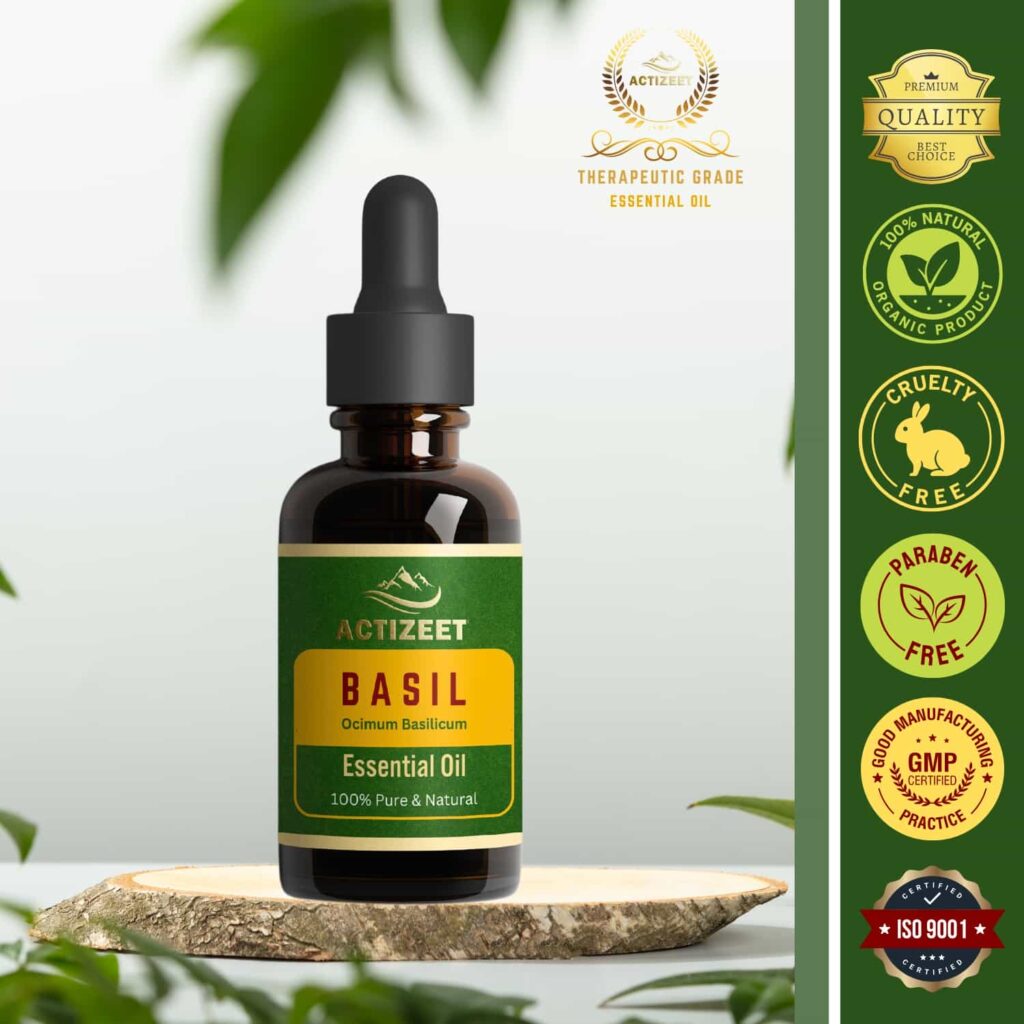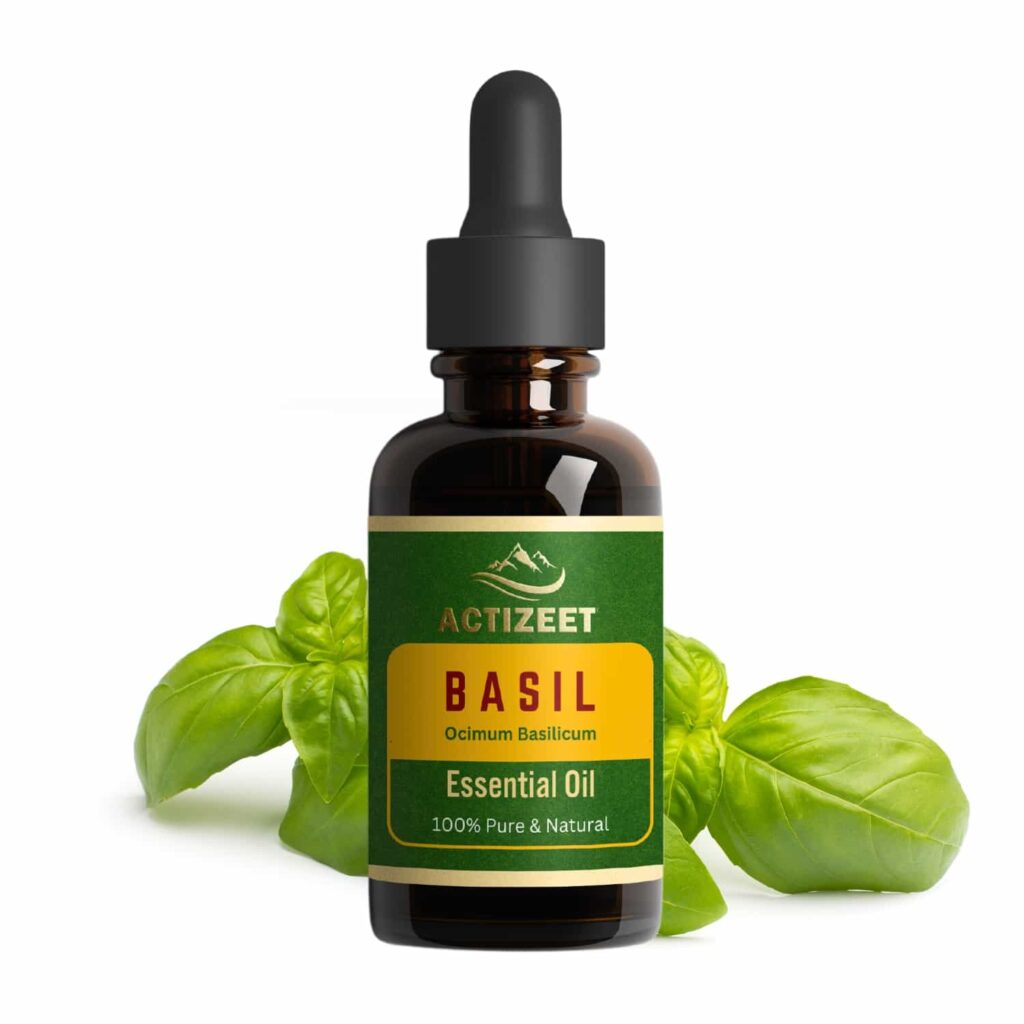Pregnancy is a time of immense joy and careful consideration, especially when it comes to health and wellness choices. Many pregnant women turn to natural remedies like essential oils to alleviate discomforts such as nausea, stress, or aches. However, not all essential oils are suitable for use during pregnancy.
Basil oil, derived from the Ocimum basilicum plant, is known for its therapeutic properties, but is basil oil safe for pregnant women? In this blog post, we’ll delve into the potential benefits, risks, and safe practices for using basil oil during pregnancy to help you make an informed decision.
Understanding Basil Oil and Its Properties
Basil oil is extracted through steam distillation of the basil plant’s leaves and flowers. It is celebrated for its aromatic, anti-inflammatory, and antimicrobial properties, making it a staple in traditional and modern wellness practices.
Key properties of basil oil:
- Anti-inflammatory: Reduces inflammation and swelling.
- Antispasmodic: Helps ease muscle spasms and tension.
- Calming: Promotes relaxation and reduces stress.
- Digestive support: Relieves nausea and aids digestion.
While these benefits make basil oil appealing, it’s important to examine its safety for use during pregnancy.
The Safety Concerns of Using Basil Oil During Pregnancy
Pregnancy involves hormonal changes and heightened sensitivity, which can impact how the body responds to substances, including essential oils. Basil oil contains compounds like estragole, which has raised concerns about its safety for pregnant women.
Potential risks:
- Estragole content: Estragole is a naturally occurring chemical found in basil oil that may have estrogen-like effects, potentially influencing hormonal balance during pregnancy.
- Uterine stimulation: Some studies suggest that basil oil might cause uterine contractions, especially when used in high concentrations.
- Allergic reactions: Pregnancy can increase the likelihood of skin sensitivity or allergic reactions to essential oils.
For these reasons, it’s crucial to exercise caution and consult a healthcare professional before using basil oil during pregnancy.
Potential Benefits of Basil Oil for Pregnant Women
Despite the concerns, basil oil offers several potential benefits when used safely and appropriately during pregnancy.
- Relieves Nausea and Digestive Discomfort
Morning sickness and indigestion are common pregnancy complaints. Basil oil’s carminative properties may help soothe the digestive system and reduce nausea. - Alleviates Stress and Anxiety
The calming aroma of basil oil can help manage stress and promote relaxation during pregnancy. - Eases Muscle Aches and Joint Pain
Pregnancy often brings physical discomfort, and basil oil’s anti-inflammatory properties can provide relief from muscle aches and joint pain when used topically.
How to Use Basil Oil Safely During Pregnancy
To minimize risks, it’s essential to use basil oil with caution during pregnancy. Here are some safe practices:
- Dilution is Key
Always dilute basil oil with a carrier oil, such as coconut or jojoba oil, before applying it to your skin. A recommended ratio is 1-2 drops of basil oil per tablespoon of carrier oil. - Avoid Internal Use
Pregnant women should avoid ingesting basil oil due to the potential risks associated with estragole. - Use Aromatherapy
Diffusing basil oil is a safer alternative to topical or internal use. A few drops in a diffuser can provide the calming benefits of basil oil without direct exposure. - Patch Test
Before using basil oil topically, perform a patch test on a small area of skin to check for any allergic reactions. - Avoid High Concentrations
Use basil oil sparingly, even when diluted, to prevent overexposure.
Alternatives to Basil Oil During Pregnancy
If you’re concerned about the safety of basil oil during pregnancy, there are several alternatives that provide similar benefits without the associated risks.
- Lavender Oil
Known for its calming properties, lavender oil is considered safe for most pregnant women and can help reduce stress and promote sleep. - Ginger Oil
A popular remedy for nausea and digestive discomfort, ginger oil is a safer alternative to basil oil for managing morning sickness. - Peppermint Oil
While peppermint oil should also be used with caution, it can help relieve headaches and muscle aches when used in moderation. - Lemon Oil
Lemon oil’s refreshing scent can uplift mood and help alleviate nausea without the risks associated with basil oil.
Expert Tips for Using Essential Oils During Pregnancy
Using essential oils during pregnancy requires extra care. Here are some expert tips to keep in mind:
- Consult Your Doctor
Always check with your healthcare provider before using any essential oils during pregnancy, including basil oil. - Use in Moderation
Essential oils are highly concentrated and should be used sparingly to avoid potential adverse effects. - Avoid During the First Trimester
The first trimester is a critical time for fetal development. Many experts recommend avoiding essential oils during this period. - Choose High-Quality Oils
Opt for pure, therapeutic-grade essential oils from reputable brands to ensure safety and efficacy. - Be Mindful of Sensitivities
Pregnancy can heighten sensitivity to smells and substances. Start with small amounts and observe how your body reacts.
Conclusion
So, is basil oil safe for pregnant women? The answer is nuanced. While basil oil offers several potential benefits, its use during pregnancy comes with risks, particularly due to the presence of estragole and its potential to stimulate uterine contractions. When used cautiously and in moderation, basil oil can provide relief for stress, nausea, and muscle aches, but always consult a healthcare professional before incorporating it into your pregnancy wellness routine.
For safer alternatives, consider essential oils like lavender, ginger, or lemon, which provide similar benefits without the associated risks. By prioritizing safety and following expert guidelines, you can enjoy the benefits of essential oils while protecting your health and that of your baby.
Would you like more information on safe essential oils for pregnancy? Let me know, and I can help create a comprehensive guide!
RELATED PRODUCTS
-
Rated 4.43 out of 5Add to cart
₹1,500.00Original price was: ₹1,500.00.₹1,200.00Current price is: ₹1,200.00. Incl. GST -
Rated 4.68 out of 5Add to cart
₹1,500.00Original price was: ₹1,500.00.₹1,200.00Current price is: ₹1,200.00. Incl. GST -
Rated 4.53 out of 5Add to cart
₹1,900.00Original price was: ₹1,900.00.₹1,450.00Current price is: ₹1,450.00. Incl. GST -
Rated 4.63 out of 5Add to cart
₹1,500.00Original price was: ₹1,500.00.₹1,200.00Current price is: ₹1,200.00. Incl. GST -
Rated 4.56 out of 5Add to cart
₹1,500.00Original price was: ₹1,500.00.₹1,200.00Current price is: ₹1,200.00. Incl. GST -
Rated 4.47 out of 5Add to cart
₹1,500.00Original price was: ₹1,500.00.₹1,200.00Current price is: ₹1,200.00. Incl. GST -
Rated 4.74 out of 5Add to cart
₹2,500.00Original price was: ₹2,500.00.₹1,950.00Current price is: ₹1,950.00. Incl. GST -
Rated 4.82 out of 5Add to cart
₹1,500.00Original price was: ₹1,500.00.₹1,200.00Current price is: ₹1,200.00. Incl. GST
Latest From Our Blog
How to Use Basil Oil in Homemade Cleaning Products
Discover how to use basil oil in homemade cleaning products...
Read MoreAromatherapy Benefits of Basil Oil: Enhance Your Well-Being Naturally
Explore the aromatherapy benefits of basil oil, from stress relief...
Read MoreWhere to Buy High-Quality Basil Oil Online: A Comprehensive Guide
Wondering where to buy high-quality basil oil online? Discover the...
Read MoreBasil Oil vs Eucalyptus Oil: Which Is Better for Your Needs?
Comparing basil oil and eucalyptus oil? Discover their unique benefits,...
Read More















